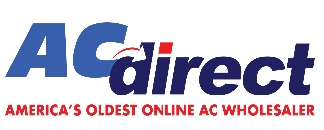Do AC Units Work Harder or Just Longer to Cool a Room
-
 By
Michael Haines
By
Michael Haines
- Jun 27, 2025

Most people assume that if their home isn’t getting cool fast, the air conditioning system must be working too hard or on the verge of failure. That’s not always the case. In fact, when temperatures soar and your indoor system is constantly humming, it might just be doing exactly what it was designed to do.
If your ac unit seems to run all day and your energy bill climbs with it, that doesn’t always mean something is broken. It could be a matter of system type, insulation, weather conditions, or installation issues. That’s why it’s important to understand the difference between a unit working "harder" and one working "longer." AC Direct can help you make sense of what’s really going on inside your walls.
What AC Units Are Designed to Do
All AC systems are built to do one thing: remove heat from your home. They don't create cold air in the way a heater generates heat. They extract warm air, pass it through refrigerant lines, and pump the heat outside. The key variable is how fast and how efficiently they can do that, especially when your home is fighting extreme heat from the sun, appliances, and poor airflow.
When it's 105 degrees outside, even a properly sized system may need to run most of the day to keep your home under 78. That doesn’t mean it’s “struggling.” It means it’s matching the demand. However, if it's running without ever reaching your thermostat setpoint, or if certain rooms are hotter than others, that could point to a mismatch between unit size and your home’s load.
Longer Runtime Is Not Always a Problem
Here’s something a lot of homeowners don’t realize: in many cases, longer runtimes are better. When an air conditioner cycles off too quickly, it usually hasn’t had time to remove much humidity. This leaves you with cold, clammy air. It also uses more energy because starting and stopping the compressor repeatedly is more taxing than a continuous, even load.
A system that runs longer is usually maintaining better temperature consistency. It may use less power over time, especially if it’s a high-efficiency two-stage or variable-speed unit that modulates output. These systems are designed to work smarter, not just harder. But they still run for long stretches because that’s how they keep conditions stable.
When Longer Runtime Becomes a Problem
If your AC system runs all day and still doesn’t bring the indoor temperature to your thermostat setting, it might be working “longer” and “harder”—just without success. That’s where you may have a real problem.
A few signs that your unit is truly overworked:
-
It runs nonstop and never hits the target temperature
-
Energy bills are far higher than last summer, with no other changes
-
You hear loud or irregular sounds coming from the compressor
-
Some rooms are noticeably warmer than others
-
The system shuts off early due to overheating
These issues could stem from low refrigerant, dirty coils, duct leaks, an improperly sized unit, or a failing compressor. If you notice any of these, it's worth having a licensed HVAC technician perform a system evaluation.
What Type of System Do You Have?
Whether your system works harder or longer depends largely on the type of equipment you’re using.
Single-stage systems turn on at full power and shut off completely. They’re either 100% on or 0% off, which means more temperature swings and more effort during extreme weather.
Two-stage systems offer a low and high setting. Most of the time, they run on low to maintain a baseline temperature and kick into high when demand spikes. These are more energy-efficient and run longer but at a lower cost per hour.
Variable-speed systems can adjust output in small increments, often running at low power for hours to maintain perfect temperature without cycling off. These are the most efficient, quietest, and best for consistent comfort in hot climates.
Knowing which system you have helps you understand whether it’s supposed to be running as often as it does. If you’re not sure, check your unit’s model number or ask your HVAC installer.
Sizing and Installation Make All the Difference
An undersized AC unit is like putting a lawn mower engine in a pickup truck. It’s not going to be enough. If your unit is too small for your square footage, ceiling height, and window exposure, it’s going to run constantly just to keep up. And in some cases, it won’t succeed.
But an oversized unit can be just as bad. It may cool the air quickly, but shut off before it has time to remove humidity. This leads to uneven cooling, short cycling, and eventually higher energy costs. Proper sizing based on Manual J calculations is critical. That’s where buying direct and working with real experts matters.
Energy Efficiency and Seasonal Load
The SEER rating of your system determines how much cooling it delivers per watt of electricity. Newer systems often range from SEER 14 to SEER 24. A unit with a SEER of 18 will use significantly less energy over a season than a unit rated at SEER 13.
During shoulder seasons like spring or fall, your system may hardly run. But during a July heatwave, even the most efficient systems will be on for long periods. That doesn’t mean they’re broken. It means they’re handling the seasonal load.
How to Know if It’s Time to Upgrade
If your AC unit is more than 12 years old and struggling to maintain comfort, it’s worth doing the math. A newer, high-SEER system may cut your electric bill enough to pay for itself in just a few years—especially if you live in a hot climate. Rebates, tax credits, and dealer discounts make the upgrade even more cost-effective.
Shop high-efficiency AC systems at wholesale prices now.
FAQ
How can I tell if my AC unit is running too much?
If your AC is running all day but never reaching your thermostat setting, that’s a red flag. Check to see if the air from the vents is cold and consistent. If it's lukewarm or if the unit shuts off before cooling the house, you may have a system issue.
Does running the AC longer wear it out faster?
Not necessarily. Modern systems are designed to run for extended periods. Constant on-and-off cycling is actually more damaging than a long, smooth operation cycle.
Should I be worried if my AC never shuts off?
That depends on the temperature. If it’s over 100°F outside, it may be normal. But if the indoor temperature doesn’t drop or your electric bill is spiking, you might need a service call.
What’s better: longer run time or shorter bursts?
Longer runtime is usually more efficient and leads to better humidity control. Short bursts often mean poor sizing, bad airflow, or a faulty thermostat.
How does humidity affect AC performance?
High humidity makes it harder to feel cool. Your AC has to run longer to remove both heat and moisture. If your home still feels sticky, you may need a better dehumidification strategy.
Should I upgrade to a variable-speed AC unit?
If you want the most comfort and energy savings, yes. Variable-speed systems run continuously at low output, reducing energy use and keeping your home perfectly cool.
Is it bad if my unit runs all day during a heatwave?
Not at all. On days when outdoor temperatures are over 95°F, even a perfectly sized and working unit may need to run all day to hold steady at 75°F. That’s expected.
Final Thoughts
The next time your AC runs all day and you wonder whether it’s “working too hard,” remember that long runtime isn’t a flaw—it’s part of the system’s job. What matters is whether it’s keeping your home comfortable without overloading your utility bill.
If you’re in doubt, look at your cooling performance, energy usage, and comfort level. Is the unit keeping up? Is the air balanced throughout your home? Are costs in line with your expectations? These are the questions that matter.
And if your answers don’t line up, it may be time to consider a better, smarter system. At AC Direct, we help homeowners and contractors find the right systems for any home size, layout, or budget. And we back it with real support and wholesale pricing.

 and now, NASCAR Racing Sponsor
and now, NASCAR Racing Sponsor










